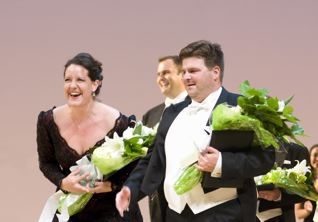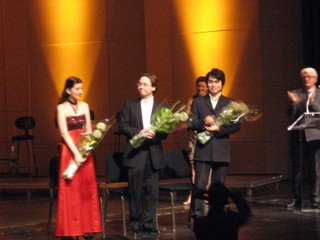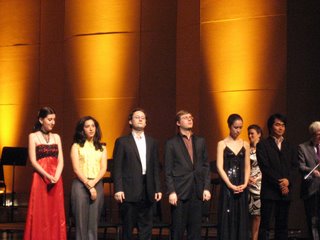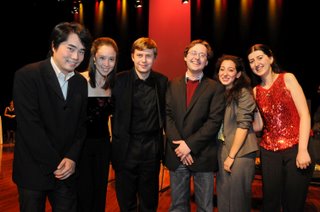Concours de Montréal (CMIM) 5e journée - demi-finale II
Dernière journée de l’épreuve demi-finale. Une journée chargée (10 candidats) et riche en émotions. Chez les femmes, les sopranos Angela Meade et Yannick-Muriel Noah ont particulièrement dominé. Deux sopranos à la voix puissante et à la technique infaillible, produisant un pianissimo étonnamment bien contrôlé dans l’aigu. Impressionnant, tout ce qu’Angela Meade peut faire avec sa voix, ce qu’elle a particulièrement démontré dans l’extrait de Il Trovatore de Verdi. Quant à Yannick-Muriel Noah, elle module admirablement sa voix au timbre chaud, spécialement dans l’extrait de La Forza del destino.
Chez les hommes, le baryton Falko Hönish a démontré sa versatilité, sa compréhension du texte et du style en présentant un programme très varié. D’abord Mozart, Wagner et Bach. Suivent le très court La Grenouillère de Poulenc et Black Max de William Bolcom, dans lesquels il se révèle un vrai comédien et conteur. Il termine sa prestation par Erlkönig de Schubert, en interprétant de façon explicite les voix du père et du fils. Voilà ce qu’on peut appeler toute une palette de couleurs! Vient ensuite le baryton Sidney Outlaw qui a obtenu en 2006 une 1re place aux auditions du Metropolitan Opera. On ne sera pas surpris de découvrir un chanteur solide qui possède une voix riche et puissante, habilement modulée. Son programme consistant comprenait entre autres deux Mozart, l’un en italien et l’autre en allemand. On retient surtout du troisième baryton, Andrew Garland, une belle voix au registre large qui chante avec facilité jusque dans l’aigu. Son talent de comédien a bien fait rire l’auditoire. Dernier candidat à se produire, le ténor Seil Kim a souffert d’un problème de santé en après-midi et sa prestation a dû être reportée à la fin. On sentait chez lui une certaine prudence, mais il se rendit au bout de son programme sans difficulté apparente. Ceux qui l’ont entendu en quart de finale savent qu’il peut faire encore mieux.
Les délibérations du jury on duré moins d’une heure. Le président, M. André Bourbeau, est venu le présenter à la salle et a donné les noms des 8 finalistes par ordre alphabétique : Jennifer Borghi, Anthony Roth Costanzo, Andrew Garland, Falko Hönish, Seil Kim, Angela Meade, Yannick-Muriel Noah et Sidney Outlaw.
L'ordre de passage:
Lundi le 25 mai à 19 h 30 :
1. Anthony Roth Costanzo
2. Falko Hönish
3. Sidney Outlaw
4. Yannick-Muriel Noah
Mardi le 26 mai à 19 h 30 :
1. Jennifer Borghi
2. Seil Kim
3. Andrew Garland
4. Angela Mead
Pour savoir plus : www.concoursmontreal.ca
L’épreuve finale avec l’Orchestre Métropolitain, sous la direction d’Alain Trudel, aura lieu lundi 25 mai et mardi 26 mai à 19 h au Théâtre Maisonneuve et sera diffusé en direct. Pour information : www.radio-canada/musique
Dimanche 24 mai : Deux classes de maître ont lieu à la Chapelle historique du Bon-Pasteur, en après-midi et en soirée. Pour information : (514) 872-5338
- Renée Banville
Labels: competition, MIMC, MIMC 2009, Montreal








